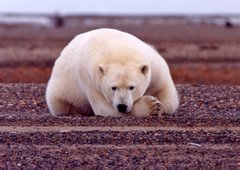This is the testimony from one of the "Mothers for Alaska", Shelly Morgan. More to come...
April 12, 2007
Tim Benintendi, Legislative Staff
Rp. Ralph Samuels, House Majority Leader
AK Climate Impact Assessment Commission
State Capitol #204, Juneau, AK 99801-1182
Dear Commissioners:
Thank you for your work on the Climate Impact Assessment Commission and thank you for accepting my testimony (both written and verbal). My name is Shelly Morgan. I live in Anchorage, Alaska with my two year old son, Robert Morgan. I am writing today on behalf of myself, my son, future grandchildren and Mothers for Alaska.
The signs of climate change are much more apparent in Alaska than in many other places. In Anchorage, I witnessed the lightening storms a few years ago, where we had more lightning during one year than in the previous thirty years. Outbreaks of spruce bark beetle have been linked to warmer climates, making a problem for our forests, changing our landscape dramatically and leading to more dead wood ready to catch fire during lightning storms and ready to spread quickly with wind. The fires on the Kenai Peninsula in recent years left me hiding inside with my doors and windows closed, due to asthma induced by excess smoke inhalation.
I am concerned that my son and his future children and grandchildren will not experience the glaciers, which are rapidly melting. I worry that invasive species, both aquatic and terrestrial, will quickly adapt to the warmer climate in Alaska, and replace our native species, transforming our wilderness and changing the wild Alaska we know and love. It saddens me that the Fur Rondy events which are a big part of Alaska’s history, fun for children and adults, and a boost to the winter economy are losing ground due to climate change. Last year, the snow sculptures melted before judging day and it was impossible to identify the winning sculpture. The Iditarod re-start keeps moving north because we don’t have enough snow year after year. This is a shame.
The impacts of climate change are even more obvious and devastating in rural villages across Alaska. It is critical that we look to the people of these communities to truly understand these impacts. The people of these villages have the traditional knowledge of what subsistence living, weather patterns, and species migrations and assemblages have been like for many generations. It is the people of these communities that truly can speak to the changes observed today. It is imperative that this traditional knowledge is given equal weight to the data collected over recent years and the climate change models predicting future patterns. We must look to the people across Alaska who hold this traditional knowledge and work together to solve the problems caused by climate change.
Like a child who cares for an elder, we must care for our Mother Earth who is suffering the consequences of our actions. The ball has been set in motion and we cannot stop the chain of events that have already been set. It is up to us now to stop the ball from rolling any further, understand the current and predicted impacts and work to mitigate these damages and abate future impacts.
Alaska is known for the theme “North to the Future”. Let’s make certain Alaska truly lives up to this phrase and leads the way in renewable energy developments. We must harness the solar and wind energy that we have in such abundance and direct our resources to expanding sustainable energy production for use by all Alaskans.
Sincerely,
Shelly Morgan
Wednesday, April 18, 2007
Subscribe to:
Post Comments (Atom)



No comments:
Post a Comment